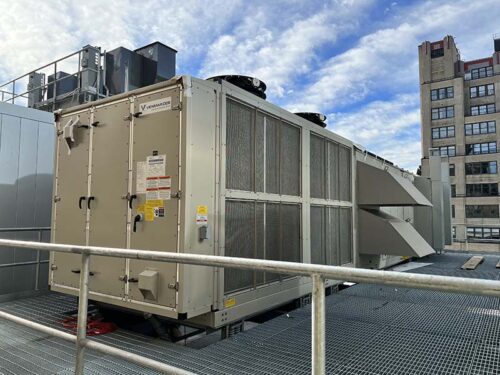SUMMARY: This blog highlights key trends in the HVAC industry, emphasizing the importance of efficiency, customized systems, and staying ahead of evolving energy codes. It underscores the critical role of commissioning in achieving reliable, energy-efficient, and comfortable building performance. By leveraging advanced technology and robust processes, HVAC professionals and building managers can optimize operations and ensure compliance with industry standards.
—————–—————–—————–—————–—————–—————–—————–——–
For commercial buildings, proper heating, ventilation, and air conditioning (HVAC) systems are non-negotiable. But even the most advanced system can underperform without proper commissioning. HVAC commissioning ensures your system operates as intended, meeting design specifications and delivering maximum efficiency. Whether you’re an HVAC technician or a building manager, understanding the elements of an HVAC commissioning checklist is key to success.
This blog dives into the fundamentals of HVAC commissioning for commercial systems, provides a detailed checklist, explores common issues, and looks ahead to the future of commissioning. Here’s everything you need to know.
The Fundamentals of HVAC Commissioning

What is HVAC Commissioning?
HVAC commissioning is the process of verifying that a building’s HVAC system is designed, installed, tested, and functioning according to the owner’s project requirements. It ensures that every component of the system works together seamlessly and reliably.
Why is it Important?
Proper commissioning is essential for creating a comfortable and energy-efficient indoor environment in commercial spaces. It provides several benefits:
- Improved Energy Efficiency: Systems perform at their optimal capacity, reducing energy consumption and lowering utility bills.
- Enhanced Comfort: Proper commissioning ensures consistent airflow, temperature, and humidity for everyone inside the building.
- Reduced Long-Term Costs: Early identification of issues means fewer costly repairs down the line.
- Extended Equipment Lifespan: Proper setup minimizes wear and tear, helping HVAC components last longer.
- Regulation Compliance: Meets local codes and standards, avoiding fines or legal consequences.
When done correctly, commissioning ensures peace of mind for building managers and comfort for occupants.
COMPUTER ROOM AIR CONDITIONING (CRAC) MAINTENANCE: WHAT TO KNOW
The Commercial HVAC Commissioning Checklist
The process involves careful steps that ensure the HVAC system is ready to perform. Below is a detailed checklist to guide professionals in running a thorough inspection.
1. System Design Verification
Why it matters: Before installation, confirm that the design meets the building’s needs. Poor design is one of the most common reasons HVAC systems underperform.
- Review the original design documents.
- Confirm that load calculations are accurate for the building size and use.
- Verify airflow and duct design specifications.
2. Equipment Installation Inspection
Why it matters: Incorrectly installed equipment leads to inefficiencies and early failures.
- Verify correct placement of major components (e.g., chillers, air handlers, compressors).
- Check alignment of ductwork and piping.
- Ensure proper sealing of ducts to avoid air leaks.
3. Functional Testing
Why it matters: Testing equipment ensures the entire system performs as intended.
- Test startup and shutdown sequences for all equipment.
- Verify that heating, cooling, and ventilation systems are operational.
- Identify and address unusual noises, vibrations, or abnormal readings.
4. Air and Water Balancing
Why it matters: Proper balancing ensures consistent airflow and temperature control across commercial spaces.
- Measure and adjust airflows through ducts and vents.
- Balance water flow in the building’s heating and cooling loops.
- Confirm compliance with design specifications for both systems.
5. Controls and Safety Checks
Why it matters: Controls regulate system operations, while safety checks help prevent accidents.
- Validate control settings, including schedules and temperature setpoints.
- Confirm correct function of thermostats and sensors.
- Test safety features, such as pressure relief valves and automatic shutdowns.
6. Documentation and Training
Why it matters: Records ensure transparency, while training equips building staff for system upkeep.
- Provide detailed commissioning reports.
- Train staff on equipment operation, maintenance schedules, and troubleshooting.
- Save as-built drawings and O&M (operation and maintenance) manuals for future reference.
HOW GLOBAL WARMING POTENTIAL (GWP) IS CALCULATED
Common Issues Found During HVAC Commissioning
Even with the best systems, problems can arise. Knowing common issues helps you address them quickly:
- Improper Installation: Misaligned ducts or poorly mounted equipment cause inefficiencies.
- Incorrect Control System Settings: Overlooked calibration can lead to energy waste.
- Unbalanced Airflow: Uneven air distribution creates hotspots or drafty areas.
- Leaks: Air or water leaks in ducts and piping lower system efficiency.
- Outdated or Missing Documentation: Lack of a clear maintenance plan can compromise long-term performance.
The Role of Technology
Advances in technology are streamlining the process.
- Building Management Systems (BMS) helps spot potential design flaws before installation.
- IoT-enabled sensors allow real-time data collection for monitoring system performance.
- Automated commissioning tools speed up functional tests and improve accuracy.
The Future
The evolution of this area is closely tied to developments in green building certifications, energy regulations, and AI technology. Here’s what’s on the horizon for commercial settings:
- Integration of AI for predictive maintenance and fault detection.
- Greater emphasis on sustainability as energy codes evolve to favor high-efficiency equipment.
- Customized systems that adapt to specific building needs using advanced analytics.
Staying ahead of these trends will help HVAC professionals maintain their competitive edge.
HVAC Commissioning with Donnelly Ensures Reliability, Efficiency, and Comfort
When it comes to commercial HVAC, commissioning is vital for long-term success. From ensuring proper systems design to leveraging advanced technology, this process keeps buildings running smoothly while maximizing cost savings and user comfort.
Building managers and HVAC technicians who invest in this process set themselves up for fewer breakdowns, optimal energy use, and compliance with industry regulations. Start implementing these checklist steps today to elevate your commission process.
For NYC building owners looking to get started with HVAC commissioning, visit Donnelly’s website and contact us today for more.